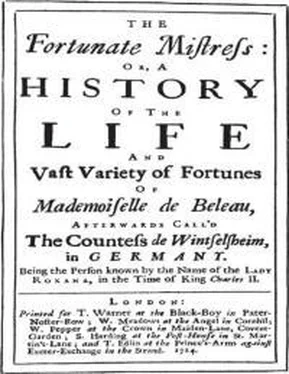The legal inequality of men and women in marriage was harder on the woman than the man, as Defoe and the Dutch merchant both know, but marriage remains a necessary institution, ‘decreed by Heaven’ (p. 191) for human happiness and social order. Defoe’s solution to the marriage problem is to be found most clearly outlined in his Conjugal Lewdness (1727). A genuine and well-founded love between the marriage partners dissolves the inequality, or, as the Dutch merchant puts it, ‘a sincere Affection between a Man and his Wife, answer’d all the Objections… and where there was a mutual Love, there cou’d be no Bondage; but that there was but one Interest; one Aim; one Design; and all conspir’d to make both very happy’ (p. 189). Here is the only true answer to all Roxana’s ‘wicked Arguments for Whoring’, but at this point in the novel she is so blinded by her own vanity and ambition that despite her affection for him she will not listen to the Dutch merchant’s pleas. As he remarks, wistfully but tellingly, ‘It is a pity so much Love… on both Sides, shou’d ever separate’ (p. 194). Her perversity in rejecting the Dutch merchant and his reasons for marriage are what will make Roxana’s fall inevitable.
Roxana is the most complex character Defoe ever created. Her story is the autobiography of a woman in the throes of a psychological disturbance so severe that eventually she becomes temporarily insane. Alone among his protagonists, she is passive and fearful in the face of difficulties and unusually dependent upon others, particularly her servant, Amy. Typically, Defoe’s heroes and heroines act alone, avoiding emotional and other entanglements as much as possible, and looking out for themselves with a sharp eye for the main chance. In his final novel, however, Defoe for the first time introduces a secondary character who throughout the story shares the action with the heroine. Frequently it is Amy who takes decisions and acts upon them when Roxana is immobilized by anxiety and indecision. Yet for all her decisiveness and capacity for independent judgement, Amy in some ways is less a character in her own right than an aspect of Roxana’s own personality. Amy does in deed what Roxana merely desires in her thoughts. But by doing so, she dramatizes Roxana’s moral quandaries. Amy shows the simple, practical solution; Roxana in her hesitation and reluctance reveals the moral complexity. And because Amy is willing to cut the Gordian knot of moral entanglements, she makes it possible for Roxana to do whatever she wishes, knowing all the while that what she wants is wrong. Since Amy acts out Roxana’s unspoken, and often unresolved, desires, she cannot also serve as the greatly needed outlet (‘Vent’ is Roxana’s word) for Roxana’s anguished emotions. Roxana, knowing that Amy’s solutions to her problems, however welcome, are really too simple, suppresses her deepest worries and her conscience, with the terrible result that the story records.
As the novel advances Roxana becomes more and more mentally ill. Although she carefully relates the symptoms of the successive stages of her mental and emotional deterioration, it is not easy for the modern reader to chart the course of her disease. This is because the vocabulary of late-seventeenth-century physiology used to describe such conditions – based on now discarded theories and in any case often maddeningly imprecise – has been replaced by the extensive terminology of modern abnormal psychology. When Roxana says that she suffered from ‘the Vapours’, or that her ‘Spirits’ were in violent motion, she is employing the terms of the old humoral medicine laid down by Galen in the second century. The notion which descended from antiquity that both physical and mental disorders were caused by an imbalance or corruption of one of the body’s four fluids, or ‘humours’ (blood, phlegm, choler, and black bile), was dying out in medical circles but the terms and many of the theories of humoral medicine retained a hold in popular conceptions of mental disease and even in the vocabulary employed by leading scientists. For example, corruption of the black bile was thought to produce ‘vapours’ which rose from the lower organs (specifically, the spleen) to the head, causing depression, headaches, bad temper, and in some cases insomnia. The term ‘vapours’ is synonymous with ‘the spleen’ and often with ‘melancholy’ (i.e., depression) – though melancholy is a very general name used of anything from low spirits to psychotic depression.
In order to explain how physical disorders affected the mind and caused mental illness the ancient medical authorities had postulated the existence of the so-called ‘animal spirits’, often thought of as subtle, highly refined particles distilled from the blood in the rational faculty of the brain, from whence they circulated throughout the body. The word ‘animal’ comes from the Latin anima , breath or soul, and hence the regular flow of the animal spirits was considered essential for human life. If disrupted or agitated the animal spirits would cause severe nervous disorders, or even death. When Roxana makes a gift of £40 a year (enough to live on) to her friend, the poor QUAKER woman, ‘sudden Joy was too much for her’. Roxana, seeing ‘the Disorder of her Mind’, explains that the surprise ‘had put her Spirits into such a violent Motion… it was ten to one odds, but that it had killed her’ (pp. 298–9).
In the late seventeenth century the theory of the animal spirits acquired a new importance for physiologists who, in the belief that man was explicable in mechanistic terms, sought physiological explanations for complex psychological conditions. The eminent physiologist Thomas Willis (1621–75), observing the destructive effect of strong passions on the health of the mind, invented an ingenious explanation. [7] See Two Discourses Concerning the Souls of Brutes (1683), pp. 201–2; and Michael V. DePorte, Nightmares and Hobbyhorses (The Huntington Library, 1974), p. 7.
What happens, according to Willis, when someone goes mad from a powerful emotion such as pride or ambition is that his imagination swells up from contemplating his present or future greatness. The expansion of the imagination causes the animal spirits to rush to the head where, overly agitated, they burst out of their normal channels and cut new paths across the brain and the nerves, with the result that the intellect is tormented and the individual goes mad. Willis, in laying stress upon the role of the animal spirits in causing virtually all psychological disturbances, saw that various mental conditions were connected, and that apparently dissimilar conditions, such as depression and mania, might well be different manifestations of the same mental disease. Given Willis’s pre-eminence, important new ideas of this sort would gradually have become disseminated in much the same way that the ideas and terms of Freud have become widely known in our own day, even to people who have never read him.
The course of Roxana’s psychological deterioration is gradual. The first sign of her disturbed state of mind is the admission that she suffers from ‘dark Intervals’ produced by her guilty conscience in living with her landlord as his wife, while knowing that to do so ‘was horribly unlawful, scandalous, and abominable’. The repression both of her dark thoughts and her conscience drives her into a ‘Stupidity’ (or lethargy, as it was sometimes called), that is, into a temporarily calm state of mind, of the sort often today induced by tranquillizers. Her tranquillity is interrupted by her terror during a stormy channel crossing and her ‘Stupidity’ now takes the form of ‘a silent, sullen kind of Grief’, one of the indications of the depression from which she is later to suffer severely. Bouts of remorse, however, alternate with periods of elation brought on by the contemplation of her own beauty and success. Like her contemporaries, Roxana believes that the ‘Madness and Distraction’ of mind that so often marks her behaviour during the height of her success are brought on by strong emotions (she mentions ‘Vanity’, ‘Pride’, and ‘an ambitious Mind’). During much of this time Roxana suffers from what physicians would then have called melancholy, a mental disorder characterized in her case by obsession and often accompanied by anxiety, guilt, delusions of grandeur, and insomnia – all of which Roxana suffers from.
Читать дальше











